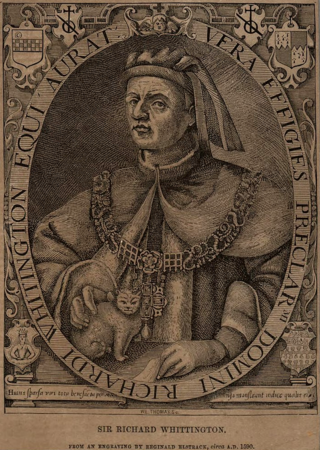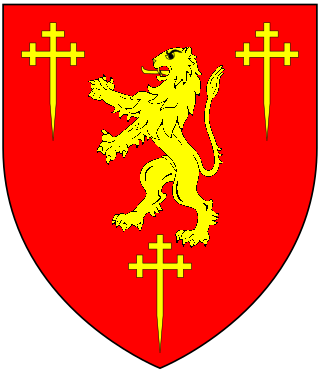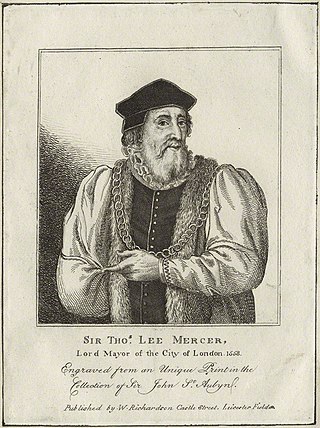Related Research Articles

Richard Whittington of the parish of St Michael Paternoster Royal, City of London, was an English merchant and a politician of the late medieval period. He is also the real-life inspiration for the English folk tale Dick Whittington and His Cat. He was four times Lord Mayor of London, a member of parliament and a Sheriff of London. In his lifetime he financed a number of public projects, such as drainage systems in poor areas of medieval London, and a hospital ward for unmarried mothers. He bequeathed his fortune to form the Charity of Sir Richard Whittington which, nearly 600 years later, continues to assist people in need.

Sir William Capel of Capel Court in the parish of St Bartholomew-by-the-Exchange in the City of London and of Hadham Hall in the parish of Little Hadham, Hertfordshire, served as Lord Mayor of London and as a Member of Parliament for the City of London.

Sir Edmund Shaa or Shaw was a London goldsmith, Sheriff of London in 1475 and Lord Mayor of London in 1482. Shaa lent money to Edward IV and, as mayor, was extensively involved in the coronation of Edward IV's brother Richard III. He was later knighted and made a member of the Privy Council.
Sir Stephen Jenyns was a wool merchant from Wolverhampton, Merchant of the Staple and Master Merchant Taylor who became Lord Mayor of London for the year of the coronation of King Henry VIII. An artistic, architectural and educational patron, he founded Wolverhampton Grammar School, and took a leading part in the rebuilding of the church of St. Andrew Undershaft in the City of London.

Sir Thomas Leigh was an English merchant and Lord Mayor of London in 1558-59. He served as a City Alderman from 1552 until 1571.
Sir Ralph Warren was twice Lord Mayor of London, for the first time in 1536 and the second in 1543.
Sir Henry Keble was a grocer and Lord Mayor of London in 1510, in the second year of King Henry VIII's reign. Sir Henry was a leading grocer in London. He was a Merchant of the Staple in Calais. He was originally from Coventry, but had settled in the parish of St Mary Aldermary. He was six times Master of the Grocers' Company. He left bequests to the company, and gave £1,000 to rebuild the church at St Mary Aldermary.

Sir John Strangways of Melbury House, Melbury Sampford, Somerset, and of Abbotsbury in Dorset, was an English politician who sat in the House of Commons variously between 1614 and 1666. He supported the Royalist side in the English Civil War.

Sir Humphrey Weld was an English merchant who was Lord Mayor of London in 1608.

Sir John Champneys (1495–1556) was City of London Sheriff in 1522 and Lord Mayor of London in 1534, when he was knighted.
Sir Stephen Slaney was an English merchant, four times Master of the Worshipful Company of Skinners, and Alderman, Sheriff and Lord Mayor of London. He has been called "one of the most picturesque of the Elizabethan Merchant Adventurers".

Sir Rowland Hayward was a London merchant, and Lord Mayor of the City in both 1570 and 1591. Through his commercial activities he acquired considerable wealth, and was able to loan money to Queen Elizabeth I and purchase properties in several counties as well as houses in and near London. He entertained the Queen at King's Place in 1587.
Sir William Browne served as Master of the Worshipful Company of Mercers from 1507 to 1514, and as alderman, auditor, Sheriff and Lord Mayor of London. He died in office on 3 June 1514 while serving his term as Lord Mayor.
Sir Henry Colet was twice Lord Mayor of London.
St. Anthony's Hospital was a medieval charitable house in the parish of St Benet Fink in the City of London. It was founded before 1254 as a cell by the Hospital Brothers of St. Anthony of Vienne in France.
Sir George Bond was a 16th-century English politician who served as Lord Mayor of London in 1587/8. A native of Somerset, he was the younger son of William Bond of Buckland and younger brother of William Bond, alderman and Sheriff of London. He was a member of the Haberdasher's Company. Prior to becoming mayor, he was elected as Sheriff of London in 1579 and alderman of Walbrook in 1584. At the time of his election in 1587, the usual Mayoral Feast was cancelled, on account of plague within the city of London.
Salomon de Basing was an English politician of medieval London. He served alongside Hugh Basing as a Sheriff of London in 1214, and was elected Lord Mayor in 1216 after the deposition of Jacob Alderman on Trinity Sunday. He was succeeded by earlier mayor Serlo le Mercer in 1217.
John Tate was the first English papermaker. According to the Oxford Dictionary of National Biography he was born about 1448. A businessman based in London, he was a member of the Mercers Company.
Henry Frowick was an English businessman, landowner, administrator and politician who was five times elected as Member of the Parliament of England for the City of London and twice chosen as the City's Lord Mayor.
References
- ↑ "TATE, Sir John (by 1444-1515), of London". History of Parliament Online. Retrieved 7 October 2016.
- ↑ Stow, John, Survey of London, 1598, 1842 edition, London, ed. Thoms, William J., pp.70-1